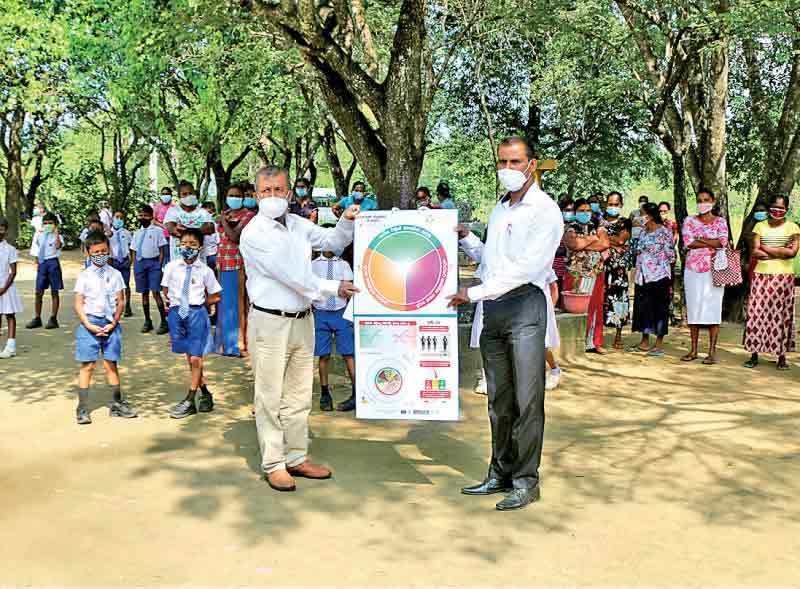Monday Feb 16, 2026
Monday Feb 16, 2026
Monday, 19 April 2021 01:28 - - {{hitsCtrl.values.hits}}

A Project Manager of ACCEND handing over a food panel developed by HPB to the Principal of the Lediyangala Primary School during its opening ceremony. The food panels were reprinted by the ACCEND project to create awareness regarding nutrition among students
“I really appreciate the service rendered by the ACCEND project. It has assisted so many residents in Wilgamuwa area through the provision of water, sanitation and hygiene facilities. We faced so many difficulties before due to lack of facilities.The project has been instrumental in alleviating our suffering,” were the heart-rendering words spoken by Chandrika Kumari, a Midwife in Wilgamuwa.
‘Assisting Communities in Creating Environmental and Nutritional Development’ (ACCEND) project, is a four-year project funded by the European Union, implemented by Adventist Development and Relief Agency (ADRA) and Oxfam. In collaboration with the Government of Sri Lanka, ACCEND aims to uplift and improve water, sanitation, hygiene, health and nutrition in the estate and rural communities of Matale, Monaragala and Nuwara Eliya Districts. Gender justice and disaster risk reduction are woven across the project activities as cross cutting themes.
One of the many activities carried out by the ACCEND project includes strengthening of poly clinics – the community centres by which the Government’s maternal and child health services are delivered. The project supported, in the Wilgamuwa Medical Officer of Health (MOH) division, four clinic centres in the Grama Niladhari (GN) areas of Mahawaththanna, Karawgahawawa, Medakanda and Aliyawala. The ACCEND project’s assistance enhanced the services rendered by polyclinics, especially to pregnant mothers and infants, through renovation and provision of equipment and other resource materials.
Mahawathanna Clinic Center’s Midwife Chandrika Kumari reavealed that the clinic center serves people from the four GN areas. She added that – prior to the project’s assistance – the four GN areas faced numerous difficulties for want of basic facilities. “The polyclinic building was dilapidated and despite the provision of electricity, the fans were inoperative. The torrential rains caused the building to be flooded as the windows were broken. In such a situation the project was pivotal to provide a sustainable caregiving for the people of the area.”
The second phase of the activity consisted of strengthening primary and secondary schools of the Wilgamuwa Divisional Secretariat. This was done through structural renovation, provision of educational resources and the establishment of a school garden to promote and empower the students towards improved health and nutrition. The schools which were privileged to receive a facelift were Mahawathanna Primary School, Bogahawewa Primary Schools, Kakalathanna Secondary School, Lediyangala Primary School and Weheragalyaya Primary School.
Established in 1956, the Mahawathanna Primary School in Wilgamuwa GN area currently has an enrollment of 85 children and comprises of seven staff members. The services provided through the project were the renovation of the school’s main hall by repairing the ceiling and painting the building and the construction of two girl-friendly latrines as it lacked a separate latrine for girls. Additionally, the establishment of a hand washing facility, a nutrition school garden and the provision of a resource corner which includes a TV and a subwoofer helped improve the school’s overall services to the children.
The ACCEND project does not only provide for the people, but rather gets them involved in project activities and works together with them to achieve the objectives of the project. Among the other schools that were renovated through the project, the Lediyangala Primary School that belongs to the Wehergalyaya GN area saw an excessive amount of community contribution towards the activity.
The project renovated the main school building, provided a television set to enhance children’s learning experience and established a school garden and complemented it by providing the required facilities and consultation. Since the teachers and the parents contributed towards the renovation of the building through labour, labour costs were saved and utilised to replace the fans and the cupboards of the school, which were in extremely poor conditions.